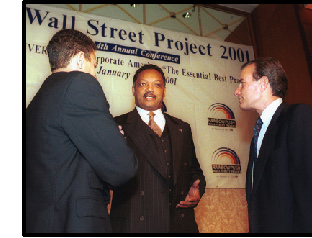|
When the Rev. Jesse Jackson admitted he had an affair with an aide
and fathered a child out of wedlock, media pundits went into overdrive
assessing his new infamy. Conservatives abandoned all attempts to
contain their glee at Jackson's embarrassment, seizing the opportunity
to denounce him for a multitude of sins from hypocrisy to extortion.
Jackson had already infuriated the GOP with his hyperbolic (and
some said hypocritical) protests of the great Florida vote theft.
So the revelations of his sexual indiscretions, especially the news
that Jackson took his pregnant mistress to visit the White House
during President Clinton's own sex scandal, bathed them in a spirit
of pure vindication. Jackson's black supporters, however, fervently
stood by their man and urged his quick return to the fray. Most
of his progressive white supporters also seemed willing to forgive
him (though many would have preferred more than a three-day sabbatical).
Significantly, Jackson's re-emergence came at the second annual
conference of the
 |
|
After his three-day sabbatical,
Jesse Jackson
headed for Wall Street.
SPENCER PLATT/NEWSMAKERS
|
Wall Street Project, an initiative he launched to help bring African-
American business aspirants closer to the sources of investment capital.
The captains of capitalism and their black petitioners (gathered at
Jackson's behest) greeted him warmly in his first post-scandal foray.
But among some African-Americans, this appearance raised more concerns
about the quality of black leadership than any revelations of sexual
indiscretion. Questions about leadership have been rumbling through
the black community with sustained intensity for several years. Don't
African-Americans need new leaders with a more mature global consciousness?
Is the civil rights leadership still relevant?
Many activists are convinced that the anger stirred up by the presidential
election and its aftermath could help power new growth in the civil
rights movement. An "emergency summit" was called by the National
Black Leadership Roundtable on January 4 to capitalize on the new
activist spirit that seems to have sprung from the election protests.
The gathering attracted leaders from the Southern Christian Leadership
Conference, the National Urban League, the NAACP, the Nation of
Islam, the National Bar Association, the Rev. Al Sharpton's National
Action Network, and other black protest and professional organizations.
Several members of the Congressional Black Caucus also attended,
along with a number of black elected officials from around the country.
Although nothing earthshaking emerged from the summit, the gathering
served as a reminder that old-style leadership remains important.
Despite talk of the need for new leadership styles to better deal
with the problems of the new millennium, it's old issues like voting
rights and affirmative action that still stir the masses of black
people. "Jesse Jackson remains a popular figure among African-Americans,
because blacks still believe that the basic fight for civil rights
is still going on," explains David Bositis, senior political analyst
for the Joint Center for Political and Economic Studies, a Washington-based
think tank. In its latest survey, Jackson received a favorable rating
by 83 percent of those blacks polled.
That hasn't quelled vocal, sometime vitriolic criticism of Jackson
from radicals, nationalists and black conservatives. Jackson is
blamed by many progressives for squandering a rare opportunity to
build on the multi-ethnic, left-populist movement that came together
around his two presidential campaigns in 1984 and 1988. Jackson
lost his luster when it became clear that he wanted the Rainbow
Coalition to serve as a vehicle of his own design rather than a
grassroots, nuts-and-bolts political organization. Although there
have been concerted efforts to increase the visibility of radical
thinkers, they were excluded from the National Black Leadership
Roundtable. Such an omission is nothing new. Organizers of the Black
Radical Congress founded the group in 1998 to help insert a radical
critique into the discourse, but so far its voice has not been heard.
Most nationalists never trusted Jackson. He was seen as a kind
of "Rev. Leroy," a duplicitous preacher in black folklore, whose
intent was seduction more than salvation. Jackson's current troubles
only bolster that portrayal. He did attract the nationalists' attention
when he aligned himself with Farrakhan in his 1984 campaign; it
seemed to herald an alliance of the divided heirs of Malcolm X and
Martin Luther King Jr. and the beginnings of a black united front.
That alliance soon fell apart, but Jackson has always included issues
dear to nationalists--like economic empowerment and community control--in
his pitch. The nationalists have bigger problems than worrying about
Jackson, however. While the enormous success of the Million Man
March seemed to herald a changing black leadership, Louis Farrakhan
hasn't held onto the imagination of the black masses.
And despite well-funded media megaphones and unwarranted appearances
on political talk shows, black conservatives have yet to stake their
claim on any black constituency. Their "compassionate conservative"
presidential candidate employed more race-friendly symbols than
any GOPer before him, but still failed to capture even 10 percent
of the black vote. Predictions that the growing black middle class
would defect from the Democrats have failed to come true.
For their part, black conservatives tend to hold up Jackson as
an example of all that is wrong with black leadership. He often
is derided as a "poverty pimp" who gains his power only by exploiting
blacks' sense of vulnerability. They argue that Jackson and the
whole civil rights fraternity utilize a myth of widespread black
poverty to more efficiently extract favors from guilty whites. But
given the increasing numbers of black conservatives (as well as
a frothing horde of white critics) who are making this familiar
charge, it's striking that the masses of African-Americans still
support Jackson so solidly.
The 2000 elections have produced a discernible change in the tempo
of the black freedom movement. The revelations about Jackson's sexual
irresponsibility will do little to taint his luster within the African-American
community. In fact, because of the black community's historically
honed impulse to circle its wagons when under attack, the scandal
may in fact add a bit to Jackson's shine.
The issue of whether his leadership is under challenge is more
an issue for whites than for blacks. Whites have always had a vested
interest in limiting the range of black leadership. Throughout African-American
history, the white leadership of the United States has tended to
choose specific figures to represent blacks. In most cases, the
leader was chosen for his (inevitably it was a man) ability to reinforce
the racial hierarchy. With rare exceptions, black people seldom
followed this lead. There's little reason to expect much change
now. 
|





